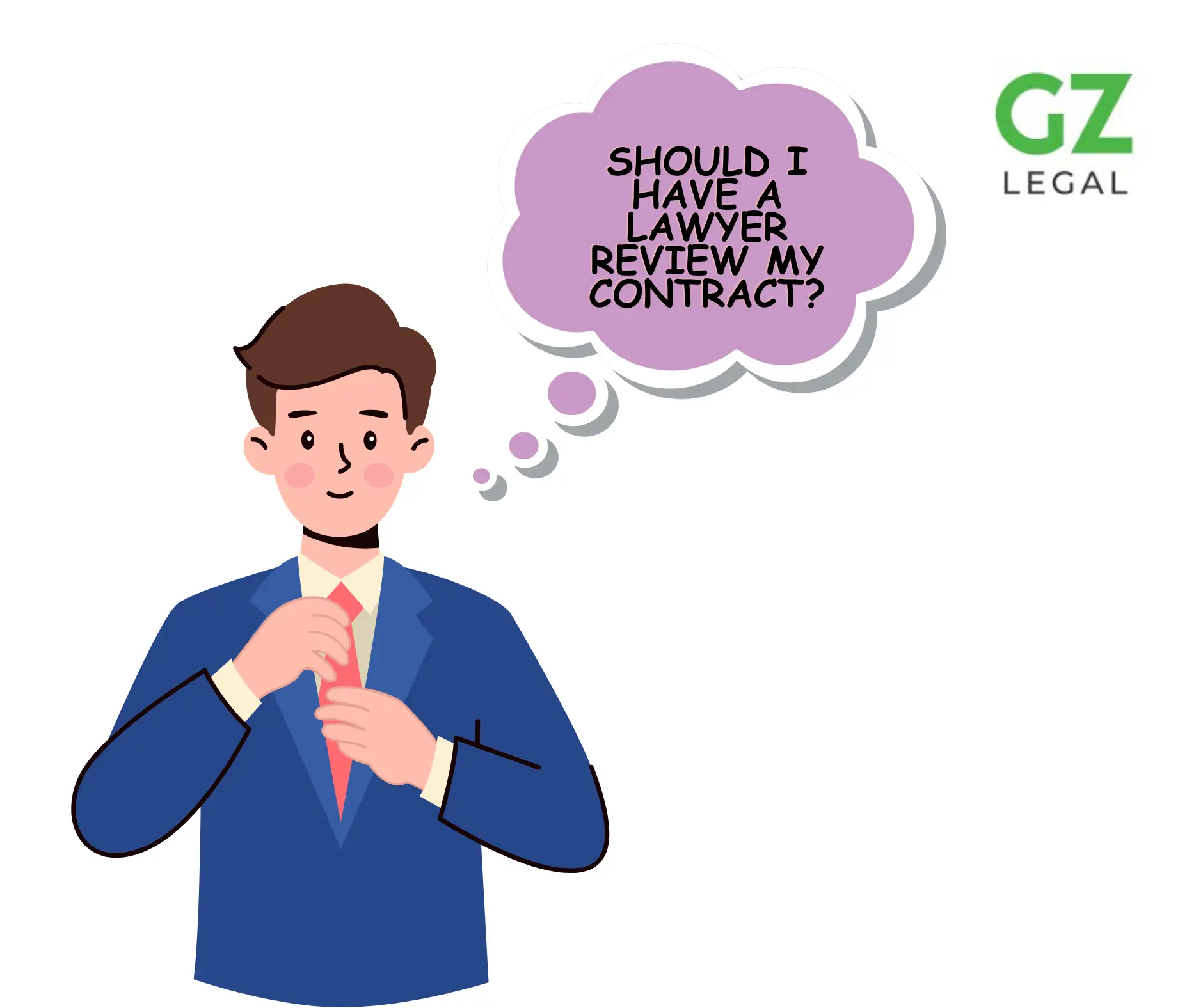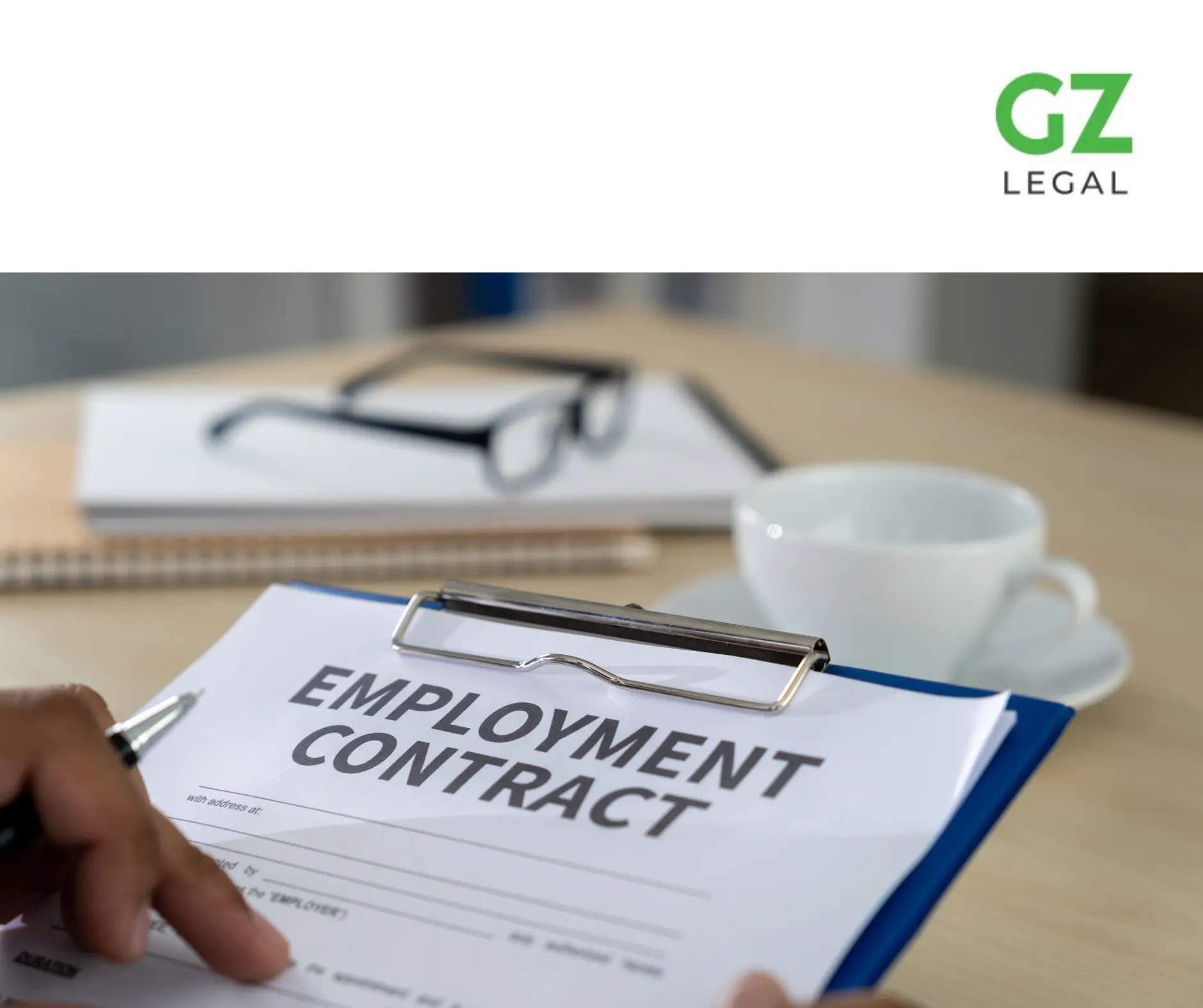Malcolm ZoppiSun Oct 15 2023
Should I Have a Lawyer Review My Employment Contract? Key Considerations Explained
A lawyer’s review can help you understand the complexities of an employment contract and safeguard your interests.
Should I Have a Lawyer Review My Employment Contract? Key Considerations Explained

When entering into a new job, it’s common to receive an employment contract outlining the terms and conditions of your employment. This document holds significant importance as it clearly defines your rights, responsibilities, and salary. Many people wonder if they should seek a lawyer’s review before signing an employment contract. The answer to this question largely depends on the individual’s circumstances.
Having a lawyer review your employment contract is beneficial in understanding the nuances and complexities of the agreement. A lawyer can identify and address potential issues and unfair terms, which might lead to disputes and challenges in the future. Moreover, they can explain the legal implications of specific clauses, ensuring you are well-aware of your obligations during and after your employment.
While reviewing an employment contract may seem like an unnecessary expense to some, it is a valuable investment for your long-term career growth and protection. A legal expert can help you understand the agreement better, so you can make an informed decision before committing to the terms.
Key Takeaways
- A lawyer’s review can help you understand the complexities of an employment contract and safeguard your interests.
- Legal expertise can identify potential issues and unfair terms to avoid disputes and challenges in the future.
- Investing in a contract review allows you to make informed decisions on your employment and protects your long-term career growth.
Understanding Employment Contract
An employment contract is a legally binding agreement between you and your employer that outlines the terms and conditions of your employment. It is important to fully understand the contents of the employment contract before agreeing to it, as it defines your rights, responsibilities, and expectations as an employee.
When you receive a job offer, it will usually be accompanied by an employment contract. The contract may be presented as a written document, such as a job and contract prior to offer letter or a more formal employment agreement. Parts of an employment contract can also be agreed through conduct, where the actions of both parties imply there’s an agreement in place.
The employment contract will typically include important information such as your job title, hours of work, salary, and other benefits. It will also outline the expectations your employer has for your performance and behaviour, as well as the policies and procedures you must adhere to. Other key clauses might include confidentiality, probationary period, notice periods, and termination terms.
Having a lawyer review your employment contract can help you fully understand its contents and identify any potential issues or unfair terms. This can give you peace of mind knowing that you are aware of the consequences of agreeing to the terms in the contract, and also help you negotiate with your employer to revise any terms that are not acceptable to you.
In addition to providing clarity and guidance on the specific terms of your contract, a lawyer can also ensure that your contract is in compliance with current UK employment law. Employment law is constantly evolving, and having a legally sound contract is essential to protect both you and your employer from any future disputes or misunderstandings.
Remember, when you agree to the terms of an employment contract, you are entering into a binding agreement with your employer. Ensuring that you understand all aspects of the contract, and seeking legal advice when needed, is essential for a successful working relationship.
Role of Lawyer in Reviewing Employment Contract

When you receive a new employment contract, having a lawyer to review it is essential for ensuring that the agreement complies with the law and protects your interests. Employment lawyers specialise in employment law and can provide you with expert legal advice and guidance on your contract.
A contract lawyer can thoroughly examine your employment contract to determine if there are any parts of the document that are unclear, unfair, or not in compliance with UK employment law. By having your employment contract reviewed, you can avoid unpleasant surprises and conflicts in the future.
During the consultation, an employment lawyer will look for clauses that may be disadvantageous to you in second job, such as restrictive covenants, unfair dismissal provisions, and any potential issues with holiday and sick pay entitlements. If any issues are identified, a lawyer can help you determine how best to address these concerns with your employer.
The expertise of employment lawyers also extends to contract reviews for both temporary and permanent positions. Regardless of your type of employment, you can benefit from professional legal advice to ensure your rights are protected. In the event that a dispute arises with your employer, having had your contract reviewed by an employment lawyer can provide a solid foundation for addressing the issue effectively.
Ultimately, the role of a lawyer in reviewing your employment contract is to help you understand your rights and avoid potential pitfalls. By seeking the guidance of a professional in employment law, you can feel confident that your employment contract review is in your best interest, allowing you to focus on your new role.
Common Components of Employment Contract
An employment contract is a legally binding agreement between you and your employer, outlining the terms and conditions of your employment. Understanding these terms is crucial as it helps you to know your rights, pay, notice periods, obligations, and responsibilities as a worker.
Pay and Benefits Package: Your contract should clearly state your salary or hourly fees, along with any additional compensation such as bonuses, equity or other benefits. Ensure you understand how payments will be made and when they are due.
Working Hours and Holiday Entitlement: The contract should specify your normal working hours and any requirements for overtime. It should also outline your holiday entitlement, including the number of days off you are entitled to and how the allocation process works.
Sick Pay and Leave: Your contract should include provisions for sick pay and leave, detailing any company-specific sick pay policies, as well as your statutory rights.
Duties and Responsibilities: Your contract should clearly outline your job duties and responsibilities within the team. This section may reference your job description, as well as any performance expectations or targets.
Notice Periods and Dismissal: The contract should clarify the required notice periods for both you and many employees of your employer in the event of resignation or dismissal. It should also outline the grounds for dismissal, the process to be followed, and any right to appeal.
Mobility Clauses and Service Agreements: Some contracts may include mobility clauses, which require you to work at different locations or travel as part of your job. Additionally, a service agreement outlines the expectations and commitments between both parties and may incorporate details like confidentiality or intellectual property rights.
It is beneficial to have a lawyer review your employment contract to ensure that your rights are protected and to help you renegotiate any unfavourable terms. This can assist you in understanding the full scope of the contract requires your role and responsibilities, as well as any potential risks or limitations to be aware of.
Unfair Practices and their Implications

When starting a new job, it’s essential to thoroughly review your employment contract to ensure it’s in line with employment law and your rights. If you encounter unfamiliar or complex terms, having a lawyer review your contract can help protect your interests and avoid potential pitfalls.
Employment Rights and Benefits: Be aware of your statutory employment rights, such as the proper probationary period, redundancy pay, and required notice periods. Examining your contract for any unfair practices or clauses is crucial, especially regarding benefits and health insurance that may be withheld or manipulated by your employer.
Restrictive Covenants: Another critical aspect of your employment contract is restrictive covenants, such as non-compete agreements, non-solicitation agreements, and non-disclosure agreements. While these serve necessary purposes, it’s possible for employers to overreach and include unfair or unenforceable terms. A legal review will ensure that these clauses meet legal requirements and don’t encroach on your rights unnecessarily.
Constructive Dismissal: In some cases, an employer’s actions might make your working situation untenable, forcing you to leave your job. This is known as constructive dismissal, and being familiar with your contract can help determine if you’re entitled just cause termination or to compensation or other remedies. A lawyer can help identify any implications in your contract that put you at risk or indicate potential grounds for constructive dismissal.
Post-Termination Restrictions: Finally, post-termination restrictions are another crucial area to examine in your employment contract. Often, these will include non-competition and non-solicitation clauses to prevent you from joining a competitor or soliciting clients. Legal review can assess their enforceability and the extent to which they are reasonable to ensure your post-employment plans aren’t unfairly restricted.
Remember that seeking professional advice to understand and navigate the complexities of your employment contract can save you from potential issues later on. This way, you can confidently accept job offers, protect your rights, and have peace of mind in your employment journey.
Legal Aspects of Employment Contracts

In the world of employment, contracts play a vital role in outlining the terms of your working arrangement. It’s important for you as an employee or a business owner to understand the legal aspects of employment contracts. Having a lawyer review your employment contract can help you ensure it complies with legal requirements and protects your interests.
An employment contract is a legally binding agreement between an employer and employee that specifies the terms of their working relationship. This includes details such as hours, salary, and job responsibilities, as well as any perks or benefits. However, there are certain legal requirements that must be met, such as the inclusion of any non-compete agreements. These agreements, when enforceable, can prevent an employee from working for a competitor or starting a similar business in a specified time frame and geographic location.
While some aspects of an employment contract will be standard across different industries, others may vary depending on the particular needs of both the employer and business. For this reason, it is important to have a clear understanding of the legal aspects of any business agreements you enter into. This is where seeking employment contract advice from a qualified lawyer becomes invaluable.
Legal professionals can review your contract and help you navigate the complexities of employment law. They can ensure your contract is in line with the latest requirements and developments, protecting you from any potential disputes or claims in the future. If you encounter any concerns about your contract, a lawyer can provide guidance on how to handle the situation, including the possibility of escalating the matter to an employment tribunal if necessary.
Employers should also consider having their business’s employment contracts regularly reviewed by a lawyer, especially when there are changes in the law or business circumstances. Doing so can help them avoid any unforeseen legal consequences and maintain a strong and compliant working relationship with former clients and their employees.
In conclusion, enlisting the assistance of a lawyer to review your employment contract can be a wise decision, ensuring that you are protected and well-informed about your rights and obligations as an employer or an employee.
Frequently Asked Questions
What are the key clauses to look for in an employment contract?
When reviewing your employment contract, pay close attention to key clauses such as job title, responsibilities, hours of work, salary, bonuses, probation period, holiday entitlement, notice period, and restrictive covenants. These elements outline the fundamental aspects of your position, and understanding them fully is crucial to ensuring the contract is fair and aligns with your expectations.
How can a lawyer help identify red flags in a contract?
A lawyer experienced in employment law will have the expert knowledge to make employment contract reviews identify potentially concerning clauses that might be illegal, unenforceable, or uncommon. They will also help you decipher any complex legal language and ensure that the terms align with employment legislation. Their guidance will provide you with peace of mind when entering into a new contract.
What are the potential risks of not reviewing an employment contract?
If you don’t review your employment contract, you might accept terms unfavorable to you or be caught unaware by hidden clauses affecting your rights and responsibilities. This could lead to misunderstandings, disputes, and even legal consequences for violating the contract. In addition, you may miss out on negotiating better terms and conditions based on your needs and expectations.
How can a lawyer ensure my rights as a worker are protected?
An employment lawyer will carefully review the terms and conditions of your contract, ensuring compliance with the law and safeguarding your rights as an employee. They can advise you on whether certain clauses are enforceable and guide you in negotiating any necessary amendments to protect your interests. Ultimately, they will help you confirm that the contract is fair and in line with industry standards.
What benefits does a thorough contract review offer to the employee?
A thorough contract review can help protect your interests, clarify your rights and responsibilities, and prevent any future misunderstandings with your new employer. By identifying any problematic clauses, you can negotiate changes to the contract before signing. Additionally, a lawyer’s expertise and guidance can give you the confidence to enter into a new job opportunity knowing your rights are secure.
How often is it recommended to have a lawyer review an employment contract?
It’s a good practice to have a lawyer review your employment contract whenever you enter into a new job or if major changes are proposed to your existing employment contract review service you. This ensures that you are fully informed and protected, and keeps you up to date with any changes in employment legislation that might affect your contract.
Find out more!
If you want to read more in this subject area, you might find some of our other blogs interesting:
- Step-by-Step Guide on How to Transfer Shares to a Holding Company
- Breach of Settlement Agreement: Consequences and Remedies Explained
- Who Gets the Money When a Company is Sold?
- What is a Counter Offer in Contract Law? Explained Simply and Clearly
- Understanding the Costs: How Much Do Injunctions Cost in the UK?
Disclaimer: This document has been prepared for informational purposes only and should not be construed as legal or financial advice. You should always seek independent professional advice and not rely on the content of this document as every individual circumstance is unique. Additionally, this document is not intended to prejudge the legal, financial or tax position of any person.